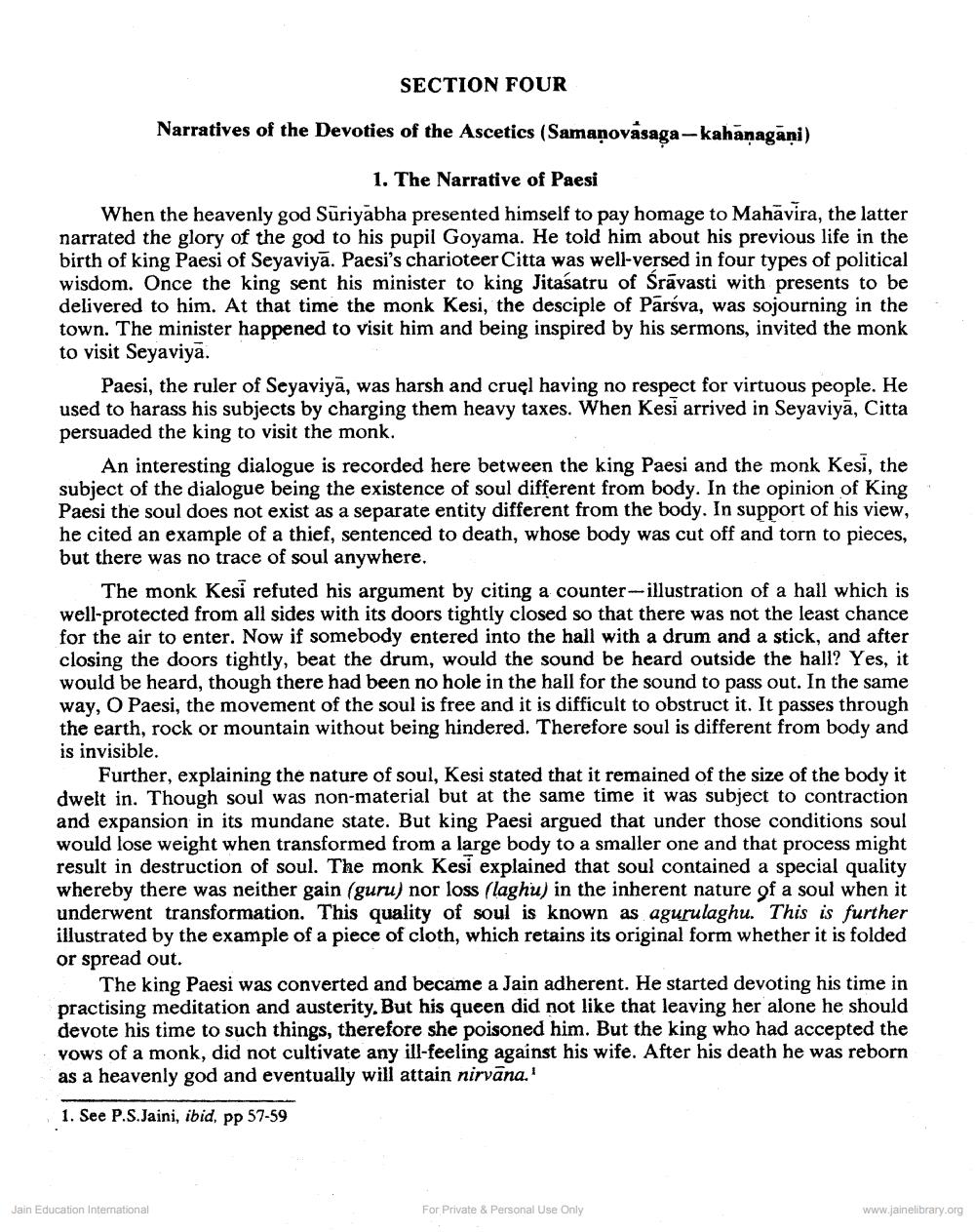________________
SECTION FOUR
Narratives of the Devoties of the Ascetics (Samaşovasaga-kahanagani)
1. The Narrative of Paesi When the heavenly god Sūriyabha presented himself to pay homage to Mahavira, the latter narrated the glory of the god to his pupil Goyama. He told him about his previous life in the birth of king Paesi of Seyaviya. Paesi's charioteer Citta was well-versed in four types of political wisdom. Once the king sent his minister to king Jitasatru of Srāvasti with presents to be delivered to him. At that time the monk Kesi, the desciple of Parsva, was sojourning in the town. The minister happened to visit him and being inspired by his sermons, invited the monk to visit Seyaviya.
Paesi, the ruler of Seyaviyā, was harsh and cruel having no respect for virtuous people. He used to harass his subjects by charging them heavy taxes. When Kesi arrived in Seyaviyā, Citta persuaded the king to visit the monk.
An interesting dialogue is recorded here between the king Paesi and the monk Kesi, the subject of the dialogue being the existence of soul different from body. In the opinion of King Paesi the soul does not exist as a separate entity different from the body. In support of his view, he cited an example of a thief, sentenced to death, whose body was cut off and torn to pieces, but there was no trace of soul anywhere.
The monk Kesi refuted his argument by citing a counter-illustration of a hall which is well-protected from all sides with its doors tightly closed so that there was not the least chance for the air to enter. Now if somebody entered into the hall with a drum and a stick, and after closing the doors tightly, beat the drum, would the sound be heard outside the hall? Yes, it would be heard, though there had been no hole in the hall for the sound to pass out. In the same way, O Paesi, the movement of the soul is free and it is difficult to obstruct it. It passes through the earth, rock or mountain without being hindered. Therefore soul is different from body and is invisible.
Further, explaining the nature of soul, Kesi stated that it remained of the size of the body it dwelt in. Though soul was non-material but at the same time it was subject to contraction and expansion in its mundane state. But king Paesi argued that under those conditions soul would lose weight when transformed from a large body to a smaller one and that process might result in destruction of soul. The monk Kesi explained that soul contained a special quality whereby there was neither gain (guru) nor loss (laghu) in the inherent nature of a soul when it underwent transformation. This quality of soul is known as agurulaghu. This is further illustrated by the example of a piece of cloth, which retains its original form whether it is folded or spread out.
The king Paesi was converted and became a Jain adherent. He started devoting his time in practising meditation and austerity. But his queen did not like that leaving her alone he should devote his time to such things, therefore she poisoned him. But the king who had accepted the vows of a monk, did not cultivate any ill-feeling against his wife. After his death he was reborn as a heavenly god and eventually will attain nirvāna.'
1. See P.S.Jaini, ibid, pp 57-59
Jain Education International
For Private & Personal Use Only
www.jainelibrary.org




